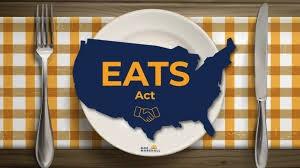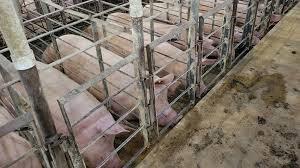The Ending Agricultural Trade Suppression (EATS) Act was drafted in response to the May 11th decision by SCOTUS upholding Proposition #12. It was the intent of the promoters of the Bill to incorporate the EATS Act into the 2023 Farm Bill that has been delayed to at the earliest, mid-2024.
The intent of the proposed legislation would be to prevent individual states from placing restrictions on systems used to rear and process livestock intended for sale in their states.
The U.S. egg industry has long since complied with Proposition #12 and Massachusetts question #3. There is an adequate supply of cage-free eggs to satisfy California and other states that have enacted legislation restricting the sale of eggs from conventional cages.
 A number of companies involved in organic and premium meat production are opposed to the EATS Act and have addressed an open letter to Congress expressing their concerns. Signatories to the letter stated, “while some companies remain silent in the name of cheaper production cost we believe it is our responsibility to amplify the concerns of our customers and businesses partners through our platforms.”
A number of companies involved in organic and premium meat production are opposed to the EATS Act and have addressed an open letter to Congress expressing their concerns. Signatories to the letter stated, “while some companies remain silent in the name of cheaper production cost we believe it is our responsibility to amplify the concerns of our customers and businesses partners through our platforms.”
Informed observers and jurists have opined on the direct and unintended consequences of the EATS Act over and above the welfare aspect. The broadly framed act could invalidate a number of necessary state regulations and would be contrary to existing laws relating to methods of production, including suppression of livestock and poultry diseases.
 The EATS Act was introduced to invalidate Proposition #12 that currently impacts a segment of the pork industry still using gestation crates for sows. The case is advanced by industry associations representing pork producers that the EATS Act would obviate the requirement for farmers to invest in group-housing for sows. Economists at the University of California-Davis ascertained that there is adequate pork available from sows housed in compliance with California Proposition #12. The economists presented data to show that there would not be any restriction on states imposing sanctions against gestation crates and that no further investment is needed in the U.S.
The EATS Act was introduced to invalidate Proposition #12 that currently impacts a segment of the pork industry still using gestation crates for sows. The case is advanced by industry associations representing pork producers that the EATS Act would obviate the requirement for farmers to invest in group-housing for sows. Economists at the University of California-Davis ascertained that there is adequate pork available from sows housed in compliance with California Proposition #12. The economists presented data to show that there would not be any restriction on states imposing sanctions against gestation crates and that no further investment is needed in the U.S.
The problem facing the pork industry is that major retailers and food service operators are committed to source pork from piglets bred from sows maintained under group housing. As has been frequently stated in CHICK-NEWS, as far as the need for conversion is concerned the train left the station years ago. Irrespective of legislation, public pressure and the policies of retailers will determine the extent of alternatives to gestation crates. Most major pork producers have recognized this reality and over the past decade have progressed in transitioning to alternative housing systems leaving those who would ignore the realities of the marketplace to rely on exports and low-price accessible markets.
It is ironic that lobbying by pork associations scuttled the “Egg Bill” that would have created a uniform Federal housing standard for hens. Now when their backs are against the wall a segment of pork producers are seeking Federal relief through legislation.